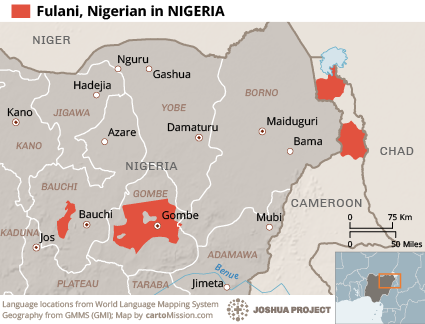Differences Between Hausa and Fulani Tribes in Nigeria
Usually, Hausa-Fulani are seen as related to each other due to the fact that they coexist within the same geographical areas in Nigeria. Although you might not be aware of any distinctions between the Hausa and Fulani tribes, there are significant differences between the two ethnic tribes, of course. With a population of over 150 million people in Africa, the Hausa and Fulani are twin ethnic groups that were once separate but are now considered to be a single, unbreakable ethnic group. They developed an unbreakable bond over the years of living together and are unable to be separated. But how can you tell one of these ethnic groups apart from the other? In this post, we will examine the distinctions between the Hausa and Fulani tribes in Nigeria and put these concerns to rest.

HAUSA TRIBE: WHAT YOU SHOULD KNOW ABOUT THEM
Western Africa is home to the Hausa-Fulani ethnolinguistic group. While some Fulani assert that they are of Semitic descent, Hausas are native to West Africa. The majority of Nigerians are either descended from the Hausa tribe or Fulani ethnic group. Due to their intermarriages and ongoing contact with various groups and locations, they have the greatest population in West Africa with about 30 million.
The northern region of Nigeria is home to the Hausa people. Due of their interaction and association with humanity, they are the tribe in West Africa with the biggest population. The majority of Hausa are farmers, and they frequently move in pursuit of better opportunities.
FULANI TRIBE: WHAT YOU SHOULD KNOW ABOUT THEM
The Fulani people, on the other side, are referred to be nomadic or nomads. Shehu Usuman Dan Fodio is the man attributed to have brought Fulani into Nigeria. They are well-known throughout practically all of West Africa because to their ongoing migration to various locations. Due to their way of life and primary occupation of raising cattle, Fulani people are referred to as nomadic.
They practically covered the entirety of West Africa due to their nomadic lifestyle. They are quite accepting of other people’s languages, which allows Hausa to stifle their own, particularly in northern Nigeria. The Fulani people occasionally consider themselves exceptional. They are the leaders of Islam in Nigeria and produce the majority of the country’s emirs.
Based on their patterns of settlement, there are typically three basic types of Fulani people: the semi-nomadic, often known as the Mbororo, the settled or “town” Fulani, and the nomadic-pastoral, or Mbororo. All year long, the Fulani pastoral people go around with their livestock. They usually don’t remain for very long—no longer than two to four months at a time. The Fulani people who are semi-nomadic are classified as either Fulđe families who temporarily settle during specific seasons of the year or Fulőe families who do not “browse” beyond their immediate surroundings. Although they own livestock, they do not venture too far from a fixed or settled homestead; they are essentially “in-betweeners.”
WHO ARE FULANI AND HAUSA PEOPLE OF NIGERIA?
People of mixed Hausa and Fulani descent are known as Hausa-Fulani. They are concentrated in the northern part of Nigeria, where the majority of them are native speakers of either the Fula or Hausa language. Although some Fulani assert Semitic ancestry, Hausas are native to West Africa. They can be found in northern states like Sokoto, Kaduna, Kano, Yobe, Kastina, Adamawa states respectively, etc. The Hausa-Fulani make up over 29% of Nigeria’s population.
HISTORICAL SIGNIFICANCE OF THE HAUSA-FULANI TRIBES
The Hausa were successful in becoming the new dominant group in the area. This came after the Nok and Sokoto, who had previously ruled Central and Northern Nigeria between 800 BCE and 200 CE, were reduced in number. The Hausa people, who share a close relationship with the Kanuri of Lake Chad, all converted to Islam in the 11th century.
Invading the Hausa territories around 1810 were the Fulani from an African nation that cut through West Africa. However, because of the two groups’ distinct cultures, there was room for integration. Instead of being distinguished as two distinct ethnic groups, the two in current times are frequently referred to as Hausa-Fulani.
The Hausa tribe continues to hold a dominant position in the northern part of the country. They have a major impact in Nigeria. Nigerian politics have been dominated by Hausa-Fulani’s for a very long time.
CULTURE OF HAUSA-FULANI PEOPLE
Let’s examine Hausa-Fulani culture to see if we can tell the two groups apart. The Niger Republic, Sudan, Cameroon, Ghana, Côte d’Ivoire, and Chad are the main locations for Hausas. In these areas, the majority of the Fulanis are similar to the Hausa people. The Hausa’s are majorly Muslims and adherents of Islam. These individuals have contributed to Nigerians accepting Islam as a religion. The Hausa people are regarded as the most attractive group of people on earth.
When the two tribes collaborate, they frequently do so while singing in tuneful melodies, whether in one of their own languages or another. Their traditional entertainment frequently takes the form of storytelling, participating in local drama, and attending local musical performances. Despite certain differences, the two tribes or ethnic-religious groupings consider themselves to be one.
Neither the appearance nor the cultural practices of the two groups are similar.
MAJOR CITIES OCCUPIED BY THE HAUSA-FULANI TRIBES IN NIGERIA
Northern Nigeria is home to the majority of the Hausa/Fulani people. Nevertheless, they can also be found in West Africa’s grassland region. Though widespread in West Africa’s grassland region, the majority of Hausa/Fulani people live in Northern Nigeria. This is particularly true in and around Sokoto, Kano, and Katsina cities. In the past, these prominent locations served as significant market hubs along the trans-Saharan caravan trade routes in the south.
The Hausa had constructed well-run city governments before the arrival of the Fulani. These Hausa-Fulani states comprised Borno, Daura, Biram, Gobir, Kano Zazzau (Zaria), and Katsina. It is well known that the Hausa Fulani have long since dominated many of the cities in northern Nigeria. Indigo City and Kano, sometimes known as the groundnut pyramids, are a couple of these cities. In addition, there are Biram, Katsina, Abuja, Bauchi, Birnin Kebbi, Damaturu, Dutse, Gombe, Gusau, Jalingo, Jebba, Jos, Katsina, Lafia, Maiduguri, Makurdi, Sokoto, Suleja, Yola, and Zaria.
THE DIFFERENCES BETWEEN HAUSA AND FULANI TRIBES
The Fulani are traditionally semi-nomadic/nomadic nomads, whereas the Hausa are farmers. The Hausa are distinguishable from the Fulani by having a distinct black Negroid body rather than a Semitic Arabic complexion. Fulani are present in every country in West Africa as well as a few in Central Africa, however Hausa are mostly found in Nigeria and the Niger Republic. The Hausa are more numerous, while the Fulani are more distributed.
Since they overcame the peaceful Hausa-speaking agrarian natives, the Fulani are strong and aggressive in Nigeria. These days, the two fundamentally distinct ethnic groups seldom differ from one another.
WHAT DO HAUSA AND FULANI HAVE IN COMMON?
Living side-by-side in West Africa, the Hausa and Fulani peoples share a rich tapestry of common threads. Centuries of intermingling, particularly the 19th-century Sokoto Caliphate founded by Fulani scholar Usman dan Fodio, have woven their histories together. Islam forms the bedrock of their societies, influencing family structures, social values, and daily life. Both cultures revere agriculture, with Hausas known for farming and Fulanis famed for their nomadic herding traditions. Trade, from local markets to the trans-Saharan routes, also binds them, with Hausa language often serving as a common tongue. While each group retains unique traditions and dialects, their intertwined past and overlapping practices make the Hausa and Fulani more than just neighbors – they are threads woven into the same vibrant cultural fabric.
CONCLUSION
Living as a single faith or race tends to promote greater development and increase inter-personal peace and stability. To achieve prosperity and peace, Nigerians must come to view each other as more than just fellow citizens of the same country. This is extremely vital right now, when banditry and insecurity are at an all-time high in the nation.
Let’s begin to appreciate the Gbagyi-Bassa, Nupe-Kaanda, Ibibio-Efik, Dibo-Abawa, and Igbo-Yoruba cultures in the same manner that we do the Hausa-Fulani culture. This will restore peace and greatness to our nation. No country, religion, or clan can endure alone, and neither can any man. This post is that long so that we may emphasize the crucial distinctions between the Hausas and Fulanis.


